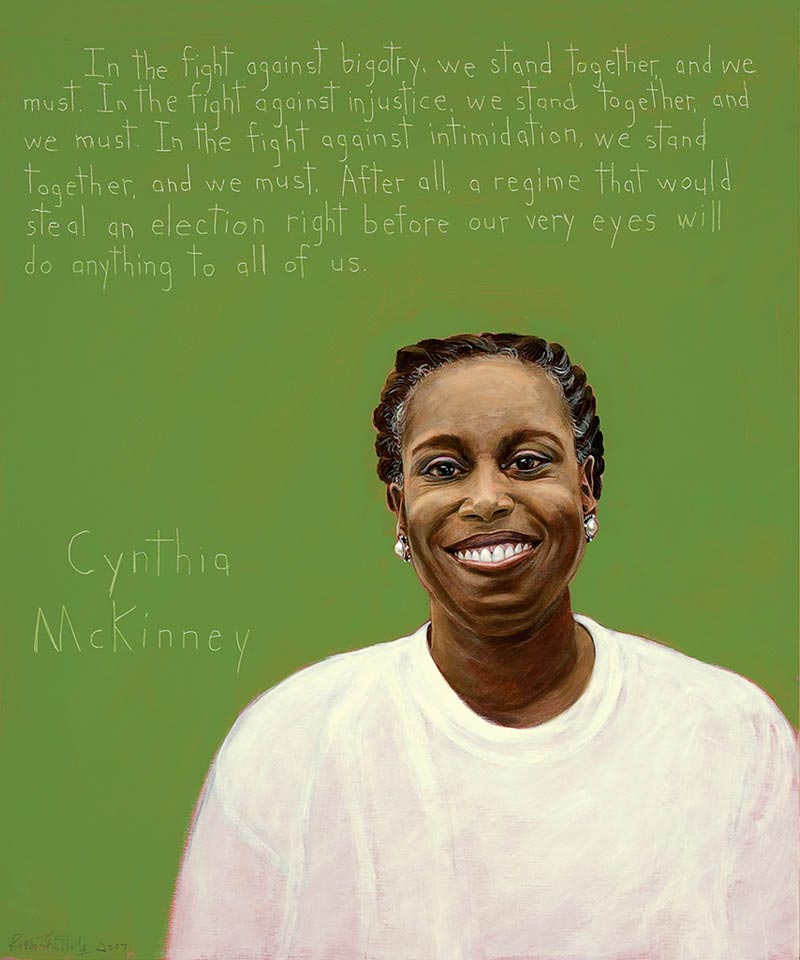
Cynthia McKinney
State of Georgia Congresswoman, US Congresswoman, Green Party Presidential Candidate : b. 1955
“In the fight against bigotry, we stand together, and we must. In the fight against injustice, we stand together, and we must. In the fight against intimidation, we stand together, and we must. After all, a regime that would steal an election right before our very eyes will do anything to all of us.”
Biography
Cynthia McKinney has made a career of speaking her mind and challenging authority. With her opinions, actions, and even her sense of style, McKinney has inspired both admiration and controversy.
McKinney´s political career began unofficially in 1986 when her father, Georgia State Representative Billy McKinney, put her name on the ballot as a write-in. Cynthia McKinney was living in Jamaica at the time and did not take the matter seriously; still, she garnered a large percentage of votes without even trying. Two years later, McKinney ran for and won the seat, creating the first father/daughter combination to serve together in the Georgia State House of Representatives. Cynthia immediately began making her own mark, defying House dress codes for women by wearing trousers instead of dresses. She spoke out against the first Persian Gulf War, and despite being in the House with her father, she often disagreed and voted against him.
In 1992, McKinney won a seat in the US House of Representatives in Georgia´s newly created 11th district. She was the first African-American woman to represent Georgia in the US Congress. McKinney became Secretary of her Democratic freshman class and was placed on both the Agricultural Committee and the International Relations Committee. Her gold tennis shoes and braided hairstyle became her trademarks, and effectively raised her profile on a House floor dominated by white men.
Though a Democrat during President Clinton’s tenure, McKinney voted against NAFTA, showing that she was not one to simply follow the Party line. McKinney worked hard in Washington to clean up pollution in her district and improve its rural roads.
During her second term, McKinney earned distinctive committee assignments with the National Security Committee and the International Relations Committee’s International Operations and Human Rights Subcommittee. A supporter of a Palestinian State in Israel-occupied territory, she sparked controversy by criticizing American policy in the Middle East. After the 9/11 attacks, McKinney suggested the President might have had prior knowledge of 9/11. The criticism she received from this highly controversial idea probably contributed to her defeat in the 2002 election; however, she ran for the seat again and was re-elected in 2004.
Between terms in office, McKinney traveled the country and Europe, speaking against the war in Iraq war and also about her 2002 defeat, which she attributed to Republicans being organized to “cross over” to vote against her in the Democratic primaries. Her career, including this episode of her defeat, was made into a documentary film titled American Blackout.
Once back in office, she continued her criticism of the Bush administration on the first anniversary of the 9/11 Commission Report by gathering victims’ families and intelligence experts together on panels to address the flaws in the report and critique its recommendations regarding foreign and domestic policy.
Believing the government should not keep secrets from the people, McKinney introduced legislation to release the documents related to the death of Tupac Shakur and twice submitted a bill to release the sealed documents pertaining to Martin Luther King Jr.’s assassination.
McKinney was very active in the aftermath of Hurricane Katrina and a vocal critic of the government’s response. When Democratic Party leaders encouraged a boycott of a Select Bipartisan Committee to Investigate the Preparation for and Response to Hurricane Katrina, she chose to participate and submitted her own report on the matter.
In 2007, McKinney left the Democratic Party to become a Presidential Candidate for the Green Party.
Programs
Americans Who Tell the Truth (AWTT) offers a variety of ways to engage with its portraits and portrait subjects. Host an exhibit, use our free lesson plans and educational programs, or engage with a member of the AWTT team or portrait subjects.

Education
AWTT has educational materials and lesson plans that ask students to grapple with truth, justice, and freedom.

Exhibits & Community Engagement
AWTT encourages community engagement programs and exhibits accompanied by public events that stimulate dialogue around citizenship, education, and activism.